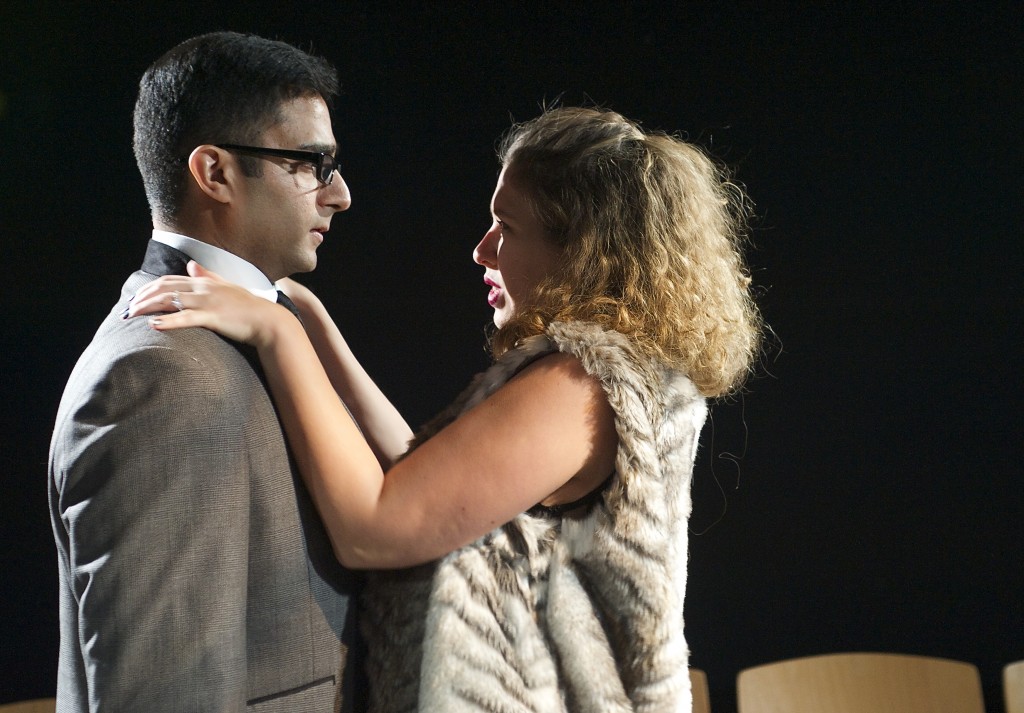Shravan Amin as Dagobert and Moriah Whiteman as Chantal in “Smartphones: A Pocket-Size Farce.” (Valentine Radev)
By Celia Wren October 27 at 2:48 PM
Is Google making us stupid? Maybe, maybe not. But the wired lifestyle has certainly dimmed the acumen of Amelia, Barnaby, Chantal and Dagobert, the principal characters in Emilio Williams’s “Smartphones: A Pocket-Size Farce.†The four narcissists are so distracted by their mobile gadgets that they can barely carry on a conversation, let alone discern the web of sexual intrigue that complicates their every move.
Spanish playwright Williams doesn’t limit himself to spoofing cellphone addiction in this strenuously waggish one-act, which the Ambassador Theater has mounted (in English) at the Mead Theatre Lab at Flashpoint: “Smartphones†nods to such cultural touchstones as “Waiting for Godot,†“No Exit,†the films of Luis Buñuel and classic farce. It’s an ambitious conflation of social satire, antic comedy and highbrow allusion, but the result sometimes feels labored. And the deliberately exaggerated acting style in director Joe Banno’s production can be exhausting to watch.
Still, guffaws regularly erupted from the audience at a recent performance of “Smartphones.†It was a show-must-go-on moment: With a medical condition sidelining Bruce Alan Rauscher, who had been scheduled to play Barnaby, actor Tekle Ghebremeschel performed the role, script in hand, while Ambassador Theater’s artistic director, Hanna Bondarewska, shouldered Ghebremeschel’s previous role — the Maid. Both replacements (who will likely continue in the parts) did a fine job: Ghebremeschel is on the way to pinning down Barnaby’s self-congratulatory, sexist personality. And Bondarewska seemed wholly at ease as she fluttered around the stage in what appeared to be a vinyl French maid outfit.
Even the script in Ghebremeschel’s hand could be seen as apt: “Smartphones†contains meta-theatrical touches, including voiced stage directions. The story line nods to “Waiting for Godotâ€: Dagobert (Shravan Amin) and Barnaby, and their respective wives, Chantal (Moriah Whiteman) and Amelia (Ariana Almajan), have gathered at the home of their friend Fedé, who has yet to arrive. As they wait — and wait — the couples chat, bicker and trade confessions, but above all interact with their cellphones, checking Facebook and Twitter, taking photos and at one point looking up the line “Hell is other people†on Wikipedia. (The line is from “No Exit.â€) In a whimsical conceit that reflects the characters’ handheld-device addiction, periodic bursts of static make them flail, as if they were suffering from fits.
Channeling these personalities, the actors often employ melodramatic or mannered intonations and movements, underscoring the absurdity of the characters’ over-amped reactions to minor issues. (A battery is losing charge! A telemarketer is calling!) The gleefully hammy sound cues work to the same end. The effect is perhaps all the more pointed because of the undramatic and indeed minimalist modern-apartment set. (David Ghatan designed the set and lights, and Lynly A. Saunders the status-signaling costumes. The sound design, credited to Gabriel Dib, draws on the one created for the world premiere of “Smartphones†in Chicago. The Ambassador production is presented in partnership with the Spanish Embassy and Spain Arts & Culture.)
Such studiously marshaled production elements notwithstanding, “Smartphones†comes across as less piquant than “Medea’s Got Some Issues,†the Williams play that appeared in the Capital Fringe Festival in 2014. This script may appeal to a broader audience, however: These days, familiarity with Greek tragedy is less common than cellphone dependence.
Wren is a freelance writer.
Smartphones: A Pocket-Size Farce By Emilio Williams. Directed by Joe Banno; assistant lighting designer, E-hui Woo; sound adaptation and movement, Michelle Taylor; music, Gabriel Dib. About 60 minutes. Through Nov. 15 at the Mead Theatre Lab at Flashpoint, 916 G St. NW. Visitwww.aticc.org. Tickets: $20-$35

Sorry, the comment form is closed at this time.